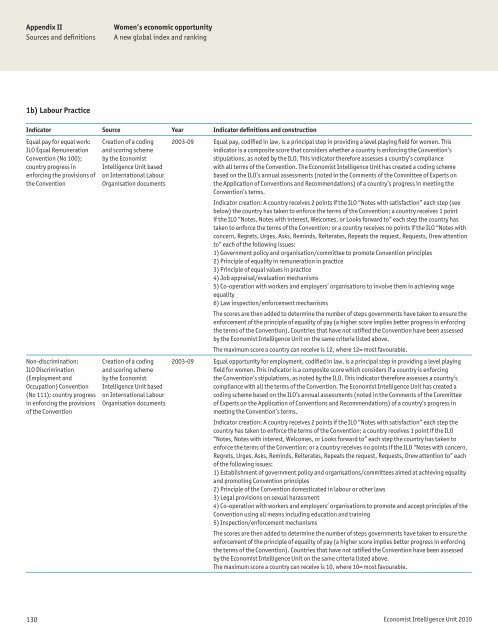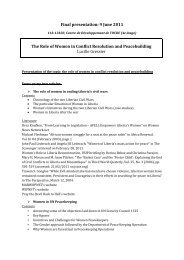Women's Economic Opportunity Index - Economist Intelligence Unit
Women's Economic Opportunity Index - Economist Intelligence Unit
Women's Economic Opportunity Index - Economist Intelligence Unit
- No tags were found...
Create successful ePaper yourself
Turn your PDF publications into a flip-book with our unique Google optimized e-Paper software.
Appendix IISources and definitionsWomen’s economic opportunityA new global index and ranking1b) Labour PracticeIndicator Source Year Indicator definitions and constructionEqual pay for equal work:ILO Equal RemunerationConvention (No 100);country progress inenforcing the provisions ofthe ConventionNon-discrimination:ILO Discrimination(Employment andOccupation) Convention(No 111); country progressin enforcing the provisionsof the ConventionCreation of a codingand scoring schemeby the <strong>Economist</strong><strong>Intelligence</strong> <strong>Unit</strong> basedon International LabourOrganisation documentsCreation of a codingand scoring schemeby the <strong>Economist</strong><strong>Intelligence</strong> <strong>Unit</strong> basedon International LabourOrganisation documents2003-09 Equal pay, codified in law, is a principal step in providing a level playing field for women. Thisindicator is a composite score that considers whether a country is enforcing the Convention’sstipulations, as noted by the ILO. This indicator therefore assesses a country’s compliancewith all terms of the Convention. The <strong>Economist</strong> <strong>Intelligence</strong> <strong>Unit</strong> has created a coding schemebased on the ILO’s annual assessments (noted in the Comments of the Committee of Experts onthe Application of Conventions and Recommendations) of a country’s progress in meeting theConvention’s terms.Indicator creation: A country receives 2 points if the ILO “Notes with satisfaction” each step (seebelow) the country has taken to enforce the terms of the Convention; a country receives 1 pointif the ILO “Notes, Notes with interest, Welcomes, or Looks forward to” each step the country hastaken to enforce the terms of the Convention; or a country receives no points if the ILO “Notes withconcern, Regrets, Urges, Asks, Reminds, Reiterates, Repeats the request, Requests, Drew attentionto” each of the following issues:1) Government policy and organisation/committee to promote Convention principles2) Principle of equality in remuneration in practice3) Principle of equal values in practice4) Job appraisal/evaluation mechanisms5) Co-operation with workers and employers’ organisations to involve them in achieving wageequality6) Law inspection/enforcement mechanismsThe scores are then added to determine the number of steps governments have taken to ensure theenforcement of the principle of equality of pay (a higher score implies better progress in enforcingthe terms of the Convention). Countries that have not ratified the Convention have been assessedby the <strong>Economist</strong> <strong>Intelligence</strong> <strong>Unit</strong> on the same criteria listed above.The maximum score a country can receive is 12, where 12= most favourable.2003-09 Equal opportunity for employment, codified in law, is a principal step in providing a level playingfield for women. This indicator is a composite score which considers if a country is enforcingthe Convention’s stipulations, as noted by the ILO. This indicator therefore assesses a country’scompliance with all the terms of the Convention. The <strong>Economist</strong> <strong>Intelligence</strong> <strong>Unit</strong> has created acoding scheme based on the ILO’s annual assessments (noted in the Comments of the Committeeof Experts on the Application of Conventions and Recommendations) of a country’s progress inmeeting the Convention’s terms.Indicator creation: A country receives 2 points if the ILO “Notes with satisfaction” each step thecountry has taken to enforce the terms of the Convention; a country receives 1 point if the ILO“Notes, Notes with interest, Welcomes, or Looks forward to” each step the country has taken toenforce the terms of the Convention; or a country receives no points if the ILO “Notes with concern,Regrets, Urges, Asks, Reminds, Reiterates, Repeats the request, Requests, Drew attention to” eachof the following issues:1) Establishment of government policy and organisations/committees aimed at achieving equalityand promoting Convention principles2) Principle of the Convention domesticated in labour or other laws3) Legal provisions on sexual harassment4) Co-operation with workers and employers’ organisations to promote and accept principles of theConvention using all means including education and training5) Inspection/enforcement mechanismsThe scores are then added to determine the number of steps governments have taken to ensure theenforcement of the principle of equality of pay (a higher score implies better progress in enforcingthe terms of the Convention). Countries that have not ratified the Convention have been assessedby the <strong>Economist</strong> <strong>Intelligence</strong> <strong>Unit</strong> on the same criteria listed above.The maximum score a country can receive is 10, where 10= most favourable.130 <strong>Economist</strong> <strong>Intelligence</strong> <strong>Unit</strong> 2010




